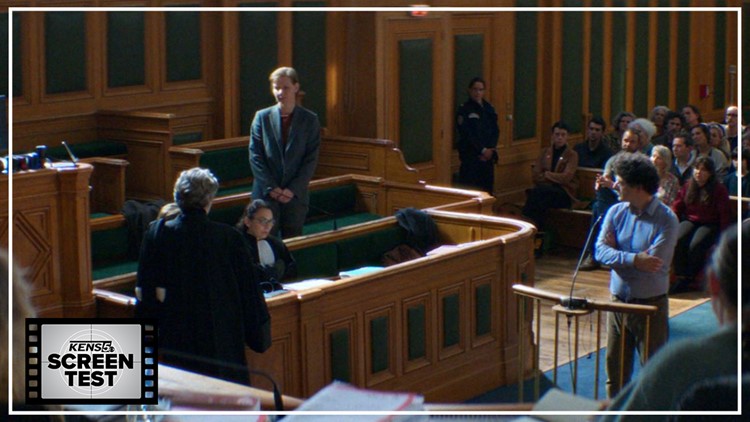TEXAS, USA — An unseen fulcrum glides so rhythmically throughout the French courtroom thriller “Anatomy of a Fall” – between fiction and reality, fact and theory, revelation and enduring mystery – that it simply makes sense when the movie decides to literalize the sensation, the audience finding itself swinging in tune with a young child’s eyes between two factions in a war of words that’s sparked during a key moment in the murder trial the movie is built around. “Anatomy of a Fall,” which won Palme d’Or honors at this year’s Cannes Film Festival, uses a few visual tricks like this to momentarily zap us into the psychological disorientation of what we’re seeing; sometimes the camera zooms abruptly, or shakily adjusts its focus when turning back to Sandra Voyter (Sandra Hüller), accused of killing her husband Samuel (Samuel Theis) after he’s found reddening a blanket of snow outside the family home.
The child's name is Daniel (played grimly by Milo Machado Graner), and though he will come to play as big a part as as anyone in his mother’s trial, here he finds himself not only defenseless but on the outside looking in as Sandra’s lawyer and a vicious prosecutor trade barbs about his parents, as if they could ever know them as well as he does—or think he did. I found myself sympathizing with him; the scenario is unimaginable (and that’s before American audiences look forward to Googling “how do french trials work” after leaving the theater).
But there’s a difference between removed and isolated, between feeling the desperation of agency slipping away and never quite feeling like you had much of a perspective in the first place. And like Daniel in this scene, “Anatomy of a Fall” holds audiences at too far a remove for the potency of its direction and the sharpness of the movie’s editing to spark much clarity, once it’s all said and done, about when those we’ve known all our lives suddenly become strangers. We find ourselves swinging on a different fulcrum—between the movie’s full potential, and that potential being scraped. It’s purposefully cold, deliberately clinical and ultimately too calculated to nourish our curiosity in the characters in any meaningful way beyond the aesthetics of the movie and its carefully timed revelations.
Yet “Anatomy of a Fall” opens in fascinating fashion, a clash of noise and conversation and shots too close for comfort culminating in Samuel’s death, and the start of a family interrogating itself in full view of the public. The film manages to sustain that magnetism for long enough that we can appreciate how writer-director Justine Triet has built on the ideas of her last movie, the scintillating “Sibyl,” when it kneads into its legal-thriller foundations knotty questions about Sandra and Samuel's relationship, and the cerebral implications of trying to fashion escape routes through one’s art. Sandra is a novelist, you see, and the movie’s most invigorating moments are rooted in our feeling that she’s trying to write her way back to freedom in real time through the precise ways she speaks about a marriage that has violently ended—specifically whether recent tensions may have laid the groundwork for murderous motivations.
The evidence has mounted against her before the trial even begins, and in every new and incredulous manner that we see experts recreating the deadly fall – digital, miniature, analog, even theatrical – it becomes an even more volatile endeavor to square our suspicions about Sandra against the dehumanization of a system that proves to be just as clinical in analyzing a marriage as picking apart the scene of a maybe-crime. You get the sense that the deeper the experts and judges drill, the more fruitless the struggle for truth becomes; everyone has their own justifications for things they can never fully know, a perverse reality that Hüller’s brilliantly layered performance characterizes more than any other single element in the film, which can otherwise feel at risk of conceptually carving away too much from its fine-grained design for there to be much to appreciate from Triet’s themes in the end result.
“Anatomy of a Fall” signals a fascinating trend for French filmmakers reckoning with these legal systems in their art. Like Alice Diop’s stunning “Saint Omer” last year, “Anatomy of a Fall” uses the arena of a criminal trial to explore social hierarchies and emotional cataclysm, both movies reveling in the paradox of unknowable motivations set against the rigid procedures of a courtroom. If “Anatomy of a Fall” is less successful than “Saint Omer” in churning a sense of impending moral fallout, it’s still able to mount a formidable case for why we feel so numbed by the end of it. A primary tension in the movie is how little Sandra can manage to share about personal affairs that were never resolved while still appearing human enough to deserve some, any sympathy–especially in Daniel’s eyes.
Here another tension is revealed, just taut enough to whip “Anatomy of a Fall” into a deeper and darker version of itself: Daniel wants to hear everything, but his mother doesn’t want to tell. The double-entendre of this movie’s title is clear before long. What remains undetermined by the time the credits arrive is whether this family can resurrect anything meaningful from its ashes.
"Anatomy of a Fall" is now in San Antonio theaters. It's rated R for some language, sexual references and violent images. Runtime: 2 hours, 32 minutes.
Starring Sandra Hüller, Swann Arlaud, Milo Machado Graner, Antoine Reinartz
Directed by Justine Triet, written by Triet and Arthur Harari
2023
---
>MORE REVIEWS:



